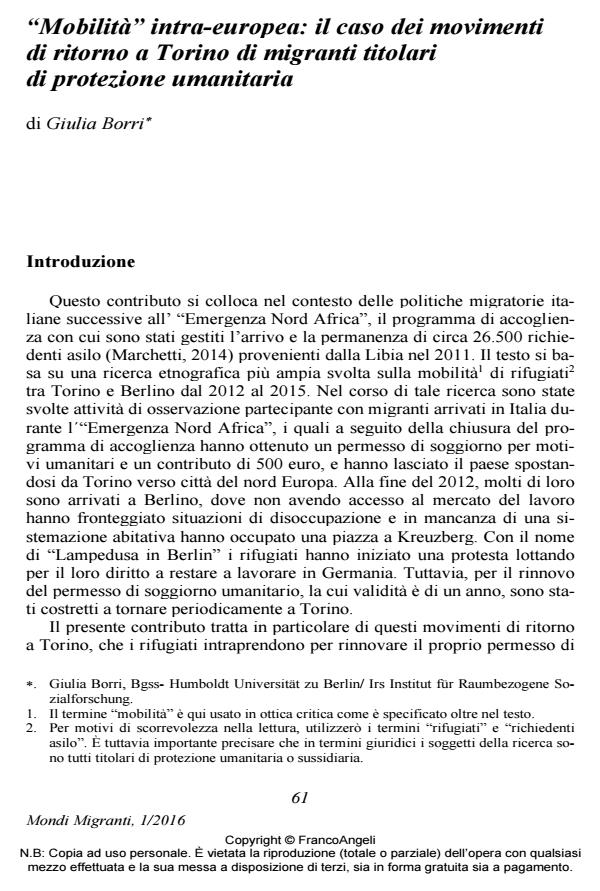"Mobility" intra-European: the case of the movements return in Turin of migrants holding humanitarian protection
Journal title MONDI MIGRANTI
Author/s Giulia Borri
Publishing Year 2016 Issue 2016/1
Language Italian Pages 22 P. 61-82 File size 80 KB
DOI 10.3280/MM2016-001004
DOI is like a bar code for intellectual property: to have more infomation
click here
Below, you can see the article first page
If you want to buy this article in PDF format, you can do it, following the instructions to buy download credits

FrancoAngeli is member of Publishers International Linking Association, Inc (PILA), a not-for-profit association which run the CrossRef service enabling links to and from online scholarly content.
This article analyzes intra-European movements of refugees, more precisely of migrants holding a humanitarian and/or subsidiary protection status, between the city of Turin and Germany. Such movements are strictly related to the closing of the Italian reception program “Emergenza Nord Africa”: as the reception centres were closed many refugees left Italy moving to other northern European countries following their desire to find better life conditions. This contribution focuses on the return movements from Germany to Turin, the latter being the city where refugees have to renew their permit of stay. This article draws on an ethnographic research conducted in Turin and Berlin from 2011 to 2015; it shows that the movements of refugees within the Schengen area cross both national territories and juridical territories, and stresses some of the relevant implications in the refugees’ everyday life. Indeed, the rights refugees are entitled to depend on the State in which they are staying: in the State that issued their document they are formally entitled to rights that they cannot access in other countries. As a consequence the marginalization, the control over mobility, and a strong socio-economic precariousness are experienced by refugees over the national borders and throughout time. The lived experiences of refugees who return to Turin from northern European countries show the contradictions of the asylum measures in Europe: in its current implementation it concurs in producing a protracted socio-economic but also a juridical precariousness.
Keywords: Refugees, regimes of mobility, ‘Emergenza Nord-Africa’, juridical status, European Union.
- Amelina A., Faist T. (2012). De-nationalizing the national in research methodologies. Key concepts of transnational studies in migration. Ethnic and racial studies, 35, 10: 1-18; DOI: 10.1080/01419870.2012.659273
- Bolzoni M., Gargiulo E., Manocchi M. (2015). The social consequences of the denied access to housing for refugees in urban settings: the case of Turin, Italy. International Journal of Housing Policy, 15, 4: 400-417, http://dx.doi.org/10.1080/14616718.2015.1053337.
- Bolzoni M., Gargiulo E., Manocchi M. (2013). The long way home. Access to housing, rights and social inclusion of asylum seekers and refugees in Turin, Italy. In Ronald R., At home on the housing market: RC43 conference book of proceedings, Centre for Urban Studies, University of Amsterdam.
- Brigate di Solidarietà attiva, Sacchetto D., Nigro G., Perrotta M., e Sagnet Y. (2012). Sulla pelle viva. Nardò: la lotta organizzata dei braccianti agricoli. Roma: Derive Approdi; isbn 9788865480397.
- Faist T. (2013). The mobility turn: a new paradigm for the social sciences?.Ethnic and Racial Studies, 36, 11: 1637-1646; DOI: 10.1080/01419870.2013.812229
- Gargiulo E. (2012). L’“emergenza” dell’esclusione: il controllo locale dell’ immigrazione nel contesto italiano, la Rivista delle Politiche Sociali/ Italian Journal of Social Policy, 1: 89-116. Glick- Schiller N., Salazar N.B. (2013). Regimes of Mobility across the Globe. Journal of Ethnic and Migration Studies, 39, 2: 183-200; DOI: 10.1080/1369183X.2013.723253
- Hess S., Kasparek B. (Hg.) (2010). Grenzregime. Diskurse, Praktiken, Institutionen in Europa. Hamburg: Assoziation A.
- Jacobsen K. (2006). Refugees and Asylum seekers in Urban Areas: A Livelihoods Perspective. Journal Refugee Studies, 19, 3: 273-286; DOI: 10.1093/jrs/fel017
- Landau B.L. (2004). Urban Refugees. Research Guide. Forced Migration Org.
- Lebuhn H. (2012). Bürgerschaft und Grenzpolitik in den Städten Europas. Perspektiven auf die Stadt als Grenzraum. Peripherie, 126/127: 350-362.
- Malkki L. (1995). Refugees and Exile: From "Refugee Studies" to the National Order of Things. Annual Review of Anthropology, 24: 495-523; DOI: 10.1146/annurev.an.24.100195.002431
- Marchetti C. (2014). Rifugiati e migranti forzati in Italia. Il pendolo tra “emergenza” e “sistema”. Rehmu- Rev. Interdiscip. Mobil. Hum., Brasilia, 22, 43: 53-70.
- Mezzadra S., a cura di (2004). I confini della libertà. Per un'analisi politica delle migrazioni contemporanee. Roma: DeriveApprodi.
- Morris L. (2011). Managing Contradiction: Civic Stratification and Migrants’ Rights. International Migration Review, 37, 1: 74-100; DOI: 10.1111/j.1747-7379.2003.tb00130.x
- Morris L. (2010). Stratified Rights and the management of migration. National Distinctiveness in Europe. European Societies, 3, 4: 387-411; DOI: 10.1080/14616690120112190
- Perrotta M. (2014). Ben oltre lo sfruttamento: lavorare da migranti in agricoltura. Il Mulino, 1: 14; DOI: 10.1402/75749
- Quaderno della fondazione Alexander Langer Stiftung, Onlus, nr 3, Maggio 2015. Testo disponibile al sito: http://www.unacitta.it/flip/lampedusa-brennero/files/assets/common/downloads/page0001.pdf, data di consultazione: 13.05.2015.
- Rastello L. (2010). La frontiera addosso. Così si deportano i diritti umani. Roma: Laterza.
- Schapendonk J. (2012). Migrants´ Im/Mobilities on their way to the EU: Lost in Transit?, Tijdschriftvoor economischeen sociale geografie, 103, 5: 577-583.
- Schapendonk J. (2011). Turbulent Trajectories. Sub-Saharan African Migrants Heading North; Isbn: 9491211412, 9789491211416.
- Schapendonk J. (2010). Turbulent Trajectories: African Migrants on their way to the European Union, Societies, 2:2, 27-41; DOI: 10.3390/soc2020027
- Urry J. (2007). Mobilities. Politypress.
- Wimmer A., Glick-Schiller N. (2002). Methodological Nationalism and beyond: nation state building, migration and the social sciences, Global Networks, 2, 301-334; DOI: 10.1111/1471-0374.00043
- Into the Interstices: Everyday Practices of Refugees and Their Supporters in Europe’s Migration ‘Crisis’ Elena Fontanari, Maurizio Ambrosini, in Sociology /2018 pp.587
DOI: 10.1177/0038038518759458 - Il diritto di restare: il Regolamento Dublino, i volti, le storie e le possibili buone pratiche Ilaria Sommaruga, Annapaola Ammirati, in MONDI MIGRANTI 1/2018 pp.107
DOI: 10.3280/MM2018-001006 - Entrapping Asylum Seekers Michele Manocchi, pp.217 (ISBN:978-1-137-58738-1)
- Richiedenti asilo e rifugiate nello Sprar. Contraddizioni nel sistema d'accoglienza Pamela Pasian, Angela Maria Toffanin, in MONDI MIGRANTI 1/2018 pp.127
DOI: 10.3280/MM2018-001007
Giulia Borri, "Mobilità" intra-europea: il caso dei movimenti di ritorno a Torino di migranti titolari di protezione umanitaria in "MONDI MIGRANTI" 1/2016, pp 61-82, DOI: 10.3280/MM2016-001004